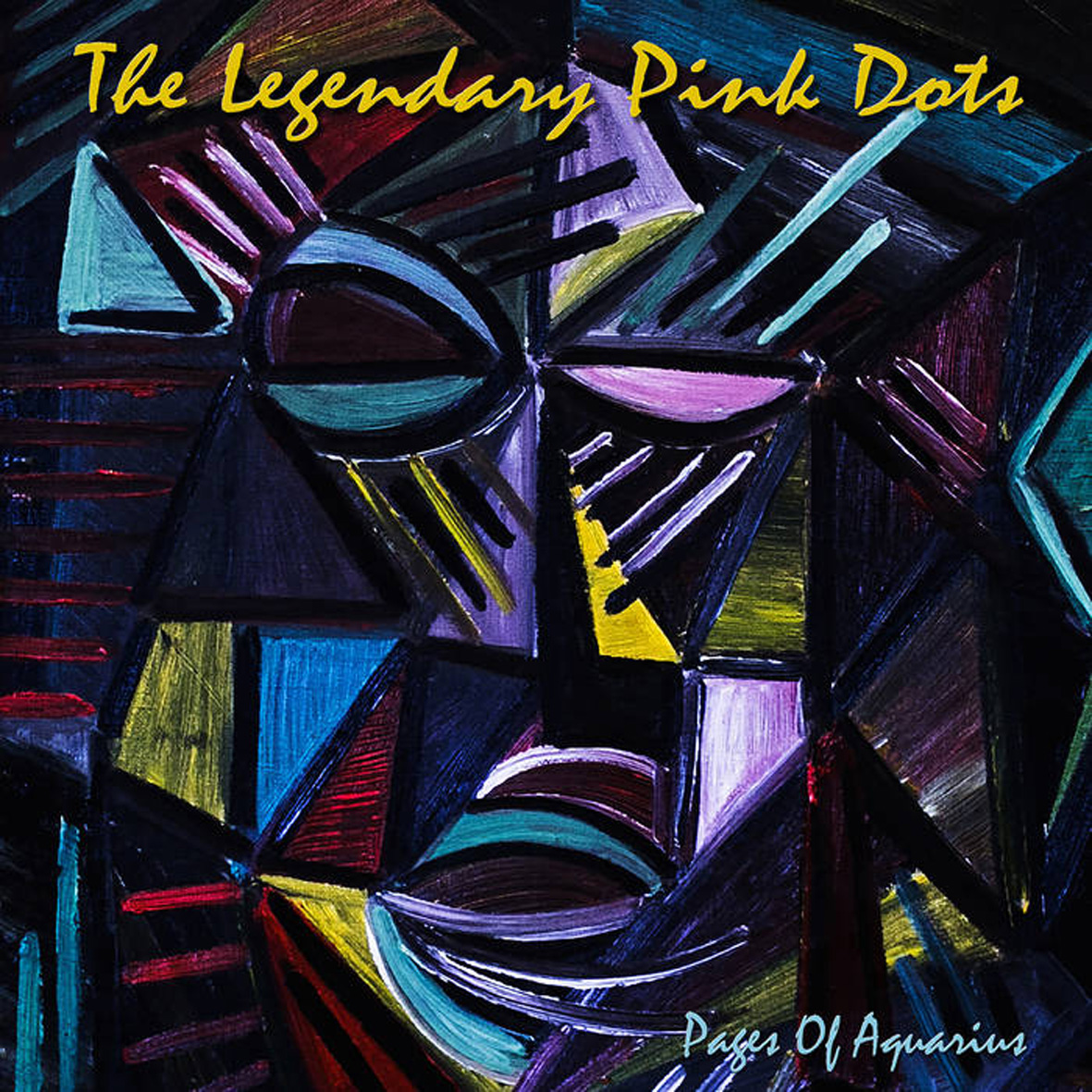Legendary Pink Dots, "Pages of Aquarius"
 The Legendary Pink Dots have been in the midst of a creative renaissance for years now, fitfully releasing some of the finest work of their career amidst the unending and distracting tide of solo projects, reissues, live albums, and archival discoveries.  The lion's share of Edward Ka-Spel's best ideas, however, have definitely been winding up in LPD's more abstract and experimental work.  I am personally perfectly fine with that, as that is the side of the Dots that I have always preferred anyway.  I suspect that most longtime fans were initially drawn to the band by their songs though and they have presumably been suffering through quite a long dry spell in that regard.  Pages of Aquarius is an album for them, as it is a solid, concise, and hook-heavy collection of industrial-tinged songs that harken back to the Dots of earlier times.  In fact, if I did not know better, I would have guessed that this album was recorded in the early '90s.  I am not sure if that is necessarily a bad thing or a good thing, but there are a definitely a handful of instant classics here regardless.
The Legendary Pink Dots have been in the midst of a creative renaissance for years now, fitfully releasing some of the finest work of their career amidst the unending and distracting tide of solo projects, reissues, live albums, and archival discoveries.  The lion's share of Edward Ka-Spel's best ideas, however, have definitely been winding up in LPD's more abstract and experimental work.  I am personally perfectly fine with that, as that is the side of the Dots that I have always preferred anyway.  I suspect that most longtime fans were initially drawn to the band by their songs though and they have presumably been suffering through quite a long dry spell in that regard.  Pages of Aquarius is an album for them, as it is a solid, concise, and hook-heavy collection of industrial-tinged songs that harken back to the Dots of earlier times.  In fact, if I did not know better, I would have guessed that this album was recorded in the early '90s.  I am not sure if that is necessarily a bad thing or a good thing, but there are a definitely a handful of instant classics here regardless.
For better or worse, the opening "Mirror, Mirror" is a near-perfect song that sets an almost impossibly high bar for the rest of the album.  While the distorted power chords definitely feel like a retro-throwback of sorts, the band is nevertheless at the height of their talents, as Edward Ka-Spel's lyrics are wry and biting; his melodies are strong; the clattering drum programming is unconventional and dynamic; and the more psychedelic touches build the song to a crescendo rather than derailing its momentum.  As far as hookiness is concerned, "Mirror" is Aquarius's pop zenith and sets the template that most of the following songs try to follow.  They may not always succeed, but they all at least fulfill some role in unfolding whatever cryptic narrative arc Ka-Spel has in mind and offer some scattered delights along the way.  While the album's lyrical content seems to have a loose and somewhat inscrutable astrological/techno-dystopian theme, the overall thread linking these eight pieces together musically is quite a bit clearer, as there is a definite formula of propulsive drum programming, buzzing synthesizers, memorable hooks, and comparatively tight songcraft running throughout Aquarius…at least for a while, anyway.  Things definitely get quite a bit more abstract near the album’s end.  The star of the show is largely the drum programming though, which simultaneously calls to mind the poppier strains of '90s industrial while still being lively and unusual enough to elevate the surrounding material.  The rolling sex groove of "D-Train" is admittedly a bit much (and certainly does not benefit from an interlude of proggy bombast), but the vaguely Latin rhythm in "The Greatest Story Ever Told" is great and the deeply wrong-sounding lounge groove of "Touching the Forelock" is even more striking.
Of course, the problem is that there are initially not many occasions besides "Mirror, Mirror" in which everything is going well at once.  For example, a few songs are derailed by maddeningly insistent sing-song melodies that resemble nursery rhymes ("The Greatest Story" is heavily indebted to "The Alphabet Song").  Elsewhere, Ka-Spel errs on the side of shrillness or the band lets their more indulgent psychedelic impulses overstay their welcome a bit.  Nevertheless, Aquarius is ultimately a very listenable and enjoyable album due to its strong rhythmic component, even if it does not scale particularly impressive heights at times.  There are a handful of notable exceptions though, particularly the understated and slow-burning ballad "Prodigal," which boasts a great vocal melody, elegantly minimal synth accompaniment, and a dub-wise percussion backdrop of quietly escalating intensity.  I am not certain that it needed to stretch out for almost 9 minutes, but it never stops being great, so the extended duration is not a problem at all.  The extended three-part closer "Don't Go There/Page Aquarian/Jacob’s Ladder" is yet another highlight, weaving a simmering and complex groove of burbling percussion; buzzes and beeps; and fake brass before taking a deep and prolonged plunge into far more lysergic territory.  Again, all of it is great, but the fact that it sprawls out for over 17 minutes might make it a tough sell for those not fully indoctrinated into LPD’s fluid understanding of time.  To my ears, it is a journey well-worth taking, as Ka-Spel and company build to quite a wonderful crescendo of mind-warping abstraction mingled with interludes of haunting melody.  It is absolutely the perfect way to end the album, but the digital and 2xLP versions toss in yet another kaleidoscopic descent into the rabbit hole of Ka-Spel’s mind in form of the 20-minute "Weight of Water." Most fans will not want to miss that bonus track, as it is probably substantial enough to have warranted its own EP.
The only real flaw with Pages of Aquarius is just that there is just too damn much of it and that not all of it is wonderful.  The presents a problem when all of the best material occurs at the beginning and the end: Aquarius could have been an absolutely perfect album if all of the breezier pieces in the middle had been culled.  While almost every song in that lull boasts at least a few things I can appreciate, the cumulative effect is that it is kind of a slog to get to the part of the album where things start to truly catch fire.  There are certainly far worse problems to have than a massive surplus of fully formed ideas, however, so it would be a shame to dwell on that.  Rather, the important thing is that Pages of Aquarius boasts at least three absolutely stellar songs.  In fact, I would even say that it is easily one of the Dots’ finest albums, as they are certainly at the peak of both their songwriting and hallucinatory powers.  Granted, this absolutely wonderful single album has the editing misfortune of being buried within the format of an exasperatingly overstuffed double album, but that is nothing that an ambitious listener with access to iTunes cannot easily fix.
 



